2020 February
2018 December August June February
2017 December September June March
2016 November August June March
2015 December October July May February
2014 December October July April February
2013 December October August May February
2012 December September July April February
2011 December September July April February
from the September, 2010 issue of Kiai!
TW Empowers Youth Struggling with Homelessness
By Kate Webster
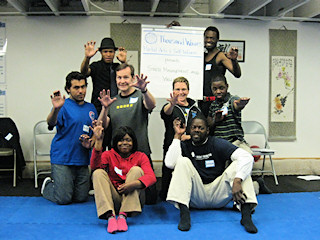 Earlier this summer, Thousand Waves partnered with The Night Ministry and held a series of violence prevention and self-empowerment workshops for their Youth Outreach Program—a program for youth leaders ages 18 to 24 years old, most of whom have or are currently struggling with homelessness. Thousand Waves provided unique programming suitable for these street-based youth leaders, while The Night Ministry procured a grant from Resurrection Lutheran Church’s Mission Endowment Fund to obtain the requisite funding for the workshops.
Earlier this summer, Thousand Waves partnered with The Night Ministry and held a series of violence prevention and self-empowerment workshops for their Youth Outreach Program—a program for youth leaders ages 18 to 24 years old, most of whom have or are currently struggling with homelessness. Thousand Waves provided unique programming suitable for these street-based youth leaders, while The Night Ministry procured a grant from Resurrection Lutheran Church’s Mission Endowment Fund to obtain the requisite funding for the workshops.
Over the years, Thousand Waves has provided The Night Ministry staff with numerous trainings including self-defense, verbal assertiveness, and stress management. Their Youth Outreach Team is one such group who received previous training; they help street-based youth leaders identify their own strengths and create solutions to their own problems—namely the violence they experience and perpetuate. After attending our workshops, Night Ministry staff noticed how effectively they could apply their newly learned skills to their lives and felt the workshops would also provide their street-based youth leaders with concrete tools to stop their own cycles of violence.
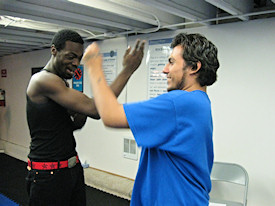
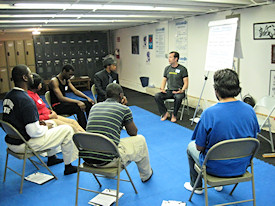
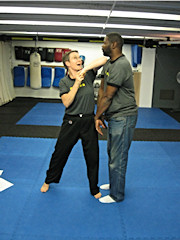
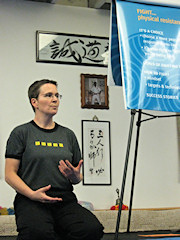
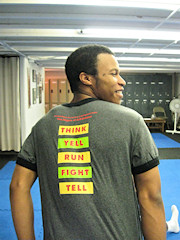
The Night Ministry reached out to Thousand Waves to create a series of workshops for youth leaders. The resulting program, led by Thousand Waves instructors Kate Webster and Jeff Edwards, was a huge success. An average of seven participants, including Night Ministry staff members Jen Rude and William Kyle, were led through a broad yet targeted range of self-defense and empowerment techniques. In session one, participants learned stress management and wellness techniques to address difficulties unique to youth experiencing homelessness: in addition to the widely acknowledged issues of scarce food and shelter, these youth must also cope with the stressors and conflicts they encounter on a daily basis within a society that treats them as “trouble-makers” or invisible.
This first session was one of the highlights for participants as it gave them a safe space to relax, let down their guard, and get in touch with their breath. Several participants commented on the broad utility of the meditation techniques. One male participant commented, “The meditation exercises were very helpful as they were great ways to cope with stress in positive ways. I plan to use the meditation more in my daily life.” And another participant stated, “The meditation was the most useful tool that I have received since the start of this workshop.”
Another participant expressed appreciation for lessons learned in the second session, commenting that “the most beneficial aspect of this course was when we learned to use our voices instead of fighting.” During the second session, participants used role-play scenarios to apply newly learned boundary-setting, de-escalation, and intervention techniques in potentially violent situations of the type with which they are frequently confronted. Of the techniques learned, participants particularly appreciated a tool called “turning up the volume.” When faced with a potentially explosive situation, instructors suggested initially starting with a low voice, and then gradually turning up the volume with the second and third attempts at verbal assertive communication—all before considering usage of physical self-defense. One participant pointed out the effectiveness of this skill stating, “I can go up a level in volume of my voice if someone does not respond the first time.” By the closing of the second session, participants had gathered a diverse range of skills for use in a variety of real-life confrontations with violence.
The third and last workshop focused on how to quickly determine the right skill to apply to a given situation, by introducing the “five fingers of self-defense (TYRFT)”— Think (mental strategies), Yell (verbal communication skills), Run (positioning strategies), Fight (physical techniques), and Tell (healing and community building tips). One participant saw how all five of these techniques could be useful in his life, “TYRFT was a great technique to learn; [it will] support me in dealing with challenging situations in the real world.”
Soon after the program was over on a weekend camping trip, Night Ministry staff witnessed participants practicing many of the physical skills and even sharing their knowledge with others, demonstrating, for example, how to get out of a wrist grab. And it wasn’t only the physical skills that stuck: during the weekend trip, one of the youth participants was feeling stressed, and another started bothering him, getting on his nerves. Historically, recounted one of the adult staff members, this participant would have lashed out at the person bothering him and things would have escalated into a fight situation. This time, however, he used de-escalation techniques and his voice to calm the situation—he kept himself safe and set clear boundaries without using violence, “I’m gonna need you to stop reading me like that—it makes me feel bad,” he said to the other participant, “maybe you shouldn’t read anyone like that for the rest of this outing.” His technique worked.
Night Ministry staff members were particularly encouraged by the fact that youth participating in the Thousand Waves’ program continued to share their knowledge with others. For example, when one of the youth leaders who did not attend the sessions found himself in a situation where he was adding fuel to a fire, escalating a situation, one of the workshop participants stepped in to offer some of the de-escalation techniques he had learned. The other youth leader calmed down, and then said, “Hey, I really missed something didn’t I?”
While he may have missed the workshops the first time, the collaborative effort between the two organizations in funding and programming has been such a success that he will have another opportunity to attend a second run of this program, to be offered this fall.
